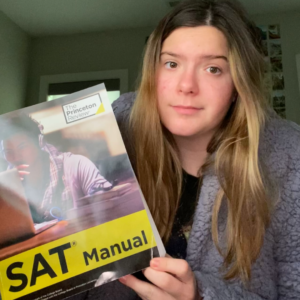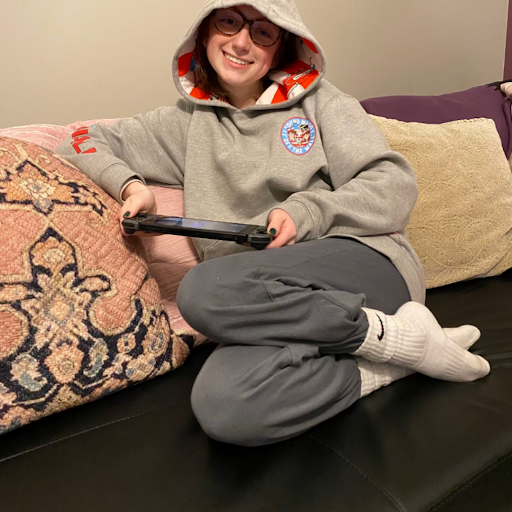This article is the first in a series of enterprise stories about individuals or groups of people in the Chapel Hill-Carrboro community who have been acutely affected by the coronavirus pandemic. To read more articles like this one, visit the series’ introductory page or click the “Spotlight” tab above.
Natalie Fleener has spent her junior year doing the same things as many of her peers: she’s taken all her classes online, tried to find ways to keep herself entertained, and practiced her favorite hobby, lacrosse.
The main difference between Fleener and many of her fellow Chapel Hill Tigers is that she’s an only child.
“It’s me, my mom, and my dad. That’s all I have,” Fleener said.
While Fleener has stayed home and followed COVID-19 safety guidelines, she’s watched many of her peers, who have siblings to spend time with, defy public health recommendations to hang out with friends.
“I try to stay away from everyone because of COVID and stuff so it definitely hurts me,” Fleener said. “It’s like I’m only hanging out with my parents, but people who have siblings to hang out with and talk to are breaking COVID safety guidelines to hang out with friends.”

Only children like Fleener are being faced with increased isolation due to the pandemic. While almost everyone has been, to some extent, cut off from their friends and peers, only children don’t have a sibling their own age to spend time with, which can have an impact on mental health. Many psychologists, including Dr. Suzanne F. Bates, a Chapel Hill-based psychologist, believe that the remoteness that comes with social distancing might cause teenagers to experience increased anxiety.
“Anxiety almost always increases and generalizes, or spreads, when the source of anxiety is avoided,” Bates said. “Exposure to the source of anxiety, often in small steps over a period of time, is a core component of evidence-based psychotherapy for anxiety difficulties and disorders.”
Bates said medical research shows anxiety issues worsen when teens avoid anxiety-inducing situations and people.
“Anxiety issues had fertile ground to worsen when teens could—and often had to—avoid anxiety-provoking situations and people,” she noted. “In the shutdown, only children have less likelihood of seeing others who are close in age, while teens with siblings are less isolated from peers and from people who share their interests.”
Finding support systems while social distancing alone
Even with COVID-19 keeping everyone apart, senior Ameila Pace has managed to stay connected to two of her friends living abroad.
“I have one friend who I text a lot in China—we communicate over Instagram. I met her in France while studying abroad. We were roommates with my host family, and we’ve kept in touch. My cousin also lives in France, and we texted each other a lot,” Pace said.
While some only children have found ways to connect with friends while social distancing, others have struggled with the isolation.
Junior Katerina Milz knows firsthand what it’s like to be an only child dealing with mental health issues.
“Being an only child during quarantine definitely had lots of effects in the beginning, specifically the first spring and summer,” Milz said. “That was really hard because I didn’t have anyone to talk to and people were not really interested in socializing outside, so it was really hard being alone. I mean, you had your parents, but it’s not like you can have a friend or can talk to somebody specifically about mental health, which can be really challenging.”
Milz said she struggled with mental health around Thanksgiving break, but—thanks to help from her friends, parents, and therapist—she was able to get better.
“My parents were really supportive and helped me find professional help and reached out to friends and other family members who have gone through similar situations and were just trying to be very supportive, and that was really good,” Milz said.
Weighing a return to in-person classes
For junior Claire Peng, the biggest struggle she’s facing isn’t mental health, but having to deal with online school.
“For me, the hardest part is the loss of structure. Like with school, there’s more flexibility—you have to kind of hold yourself accountable, and I think a lot of us have struggled with that,” Peng said.
When Chapel Hill-Carrboro City Schools announced it would return to in-person instruction on a hybrid format in late March, the move offered students—most of whom had yet to be vaccinated—a more structured educational experience. For only children, the lure of in-person classes also included seeing friends face-to-face.
“It’s been going well. Online and in-person school complement each other quite well under the hybrid plan,” Peng said. “It’s hard to say which one is better given the changing circumstances, but there are definitely perks to both. I can’t say that I won’t miss having more flexibility if we do return to (full time in-person) school next year.”
Fleener and Milz, however, have decided to stick with online learning instead of heading back in-person. Both believe it’s not worth returning since there was so little time left in the school year and the risk of COVID-19 still looms.
“I’m deciding to stay home. I just found it easier for me to be in my little bubble,” Milz said.
A sense of normalcy on the field
One thing Fleener, Milz, and Peng agree on is how beneficial being on a sports team was for them.
For Milz and Fleener, being on the lacrosse team allowed them to interact with friends and gain the typical high school experiences they’ve been missing out on.
“Going to lacrosse helps me meet underclassmen and make connections with the younger kids, too. Also, it lets me see some of my junior friends and even the seniors I kind of talked to only during lacrosse. It’s been really nice to hang out with them,” Fleener said.
Peng had to deal with the difficulty of trying out for a sport she’s never played before this year. In her freshman and sophomore years of high school, she was on the field hockey team. This year, though, she decided to try out for cross-country.
“I’ve always done track, but cross-country is definitely a first, and I didn’t really have any expectations because I’m new to the sport and also just because of the pandemic. I know a lot of people are sad that they lost opportunities.” Peng said.
‘I really hope that we go back senior year’
While Peng, Milz, and Fleener had to jump the extra hurdle of being only children while social distancing, they’ve managed to get through it and are optimistic next school year will be better—socially, athletically and academically.
“My biggest wish for next year is to be able to have a social aspect, go back and make new friends, new connections to more people, make new memories and stuff like that because I feel like with COVID, I didn’t make any memories,” Fleener said.
“I really hope that we go back senior year,” Peng added. “If we don’t, it’s okay: it’s for the best, but our high school career has basically been half online. I hope the sports seasons will return to normal with more meets and less restrictions. And, yeah, I hope to see my teachers honestly.”













[…] School students like Natalie Fleener, Katerina Milz, Amelia Pace and Clare Peng, all of whom are only children and have weathered the quarantine in isolation compared to their peers with siblings; UNC Family Medicine Nurse Practitioner LaToya Cooper, who […]